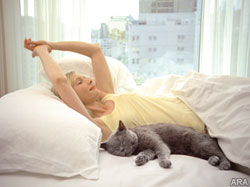(ARA) – On average, cats sleep 13 to 16 hours a day. Many of those hours are composed of naps – 20 to 30 minutes in length – hence the term “cat nap.” As a cat owner, you probably watch your feline friend curl up in a sunny spot at the edge of your bed and with a wishful sigh, contemplate joining her for a cat nap of your own.
In fact, according to the National Sleep Foundation, a short nap of 20 to 30 minutes can help improve mood, alertness and performance. And when a person is fighting a disease such as breast cancer, connecting with your cat – especially during a restful and regenerative cat nap – provides a calming influence, according to a recent Purina Cat Chow survey.
Inspired by one cancer survivor’s touching story of the role her cat played during her battle with cancer, Purina Cat Chow is doing its part to help the fight against breast cancer. For the third consecutive year, the company is donating more than $200,000 to Susan G. Komen for the Cure and will raise awareness for breast cancer through its “Cat Nap for the Cause campaign.” In addition, when a person becomes a fan of www.facebook.com/purinacatchow and registers to take a cat nap this October, another $2 donation will be made to Susan G. Komen, up to $150,000. Purina Cat Chow Indoor and Purina Cat Chow Complete also will feature pink packaging this October in honor of National Breast Cancer Awareness Month.
Celebrity cat lover and breast cancer awareness supporter Kate Walsh joins the campaign to raise funds and awareness.
“One of my favorite things to do is hang out with my cats Billy and Pablo … and I’m not kidding. I know many people share the same bond with their pets,” says Walsh, star of the ABC hit show “Private Practice.” “As a cat lover and daughter of a courageous woman who has been a breast cancer survivor for more than 10 years, I’m thrilled to support a campaign that empowers cat lovers and breast cancer supporters to make a difference and raise funds simply by taking a cat nap this October.”
The Purina Cat Chow national survey found that 84 percent of women battling breast cancer said their cat had a calming effect on them during their treatment. Cats also provided daily support to the patient, according to 76 percent of survivors surveyed.
Dr. Karen Sueda, a diplomate at the American College of Veterinary Behaviorists, says that cats are perceptive to their owners needs during an illness.
“Whether pet owners are fighting a disease such as breast cancer or going through a rough period in life such as job loss or financial stress, their cats often display intuitive behaviors of knowing when they need extra love and support,” says Sueda.
Susan G. Komen for the Cure is the world’s largest grassroots network of breast cancer survivors and activists fighting to save lives, empower people, ensure quality care for all and energize science to find the cures. The organization has invested more than $1.5 billion toward ending breast cancer, becoming the world’s largest source of non-profit funds dedicated to the fight against breast cancer.
Visit www.facebook.com/purinacatchow to sign up to take a nap to support the cause, and for more information visit www.catchow.com.

